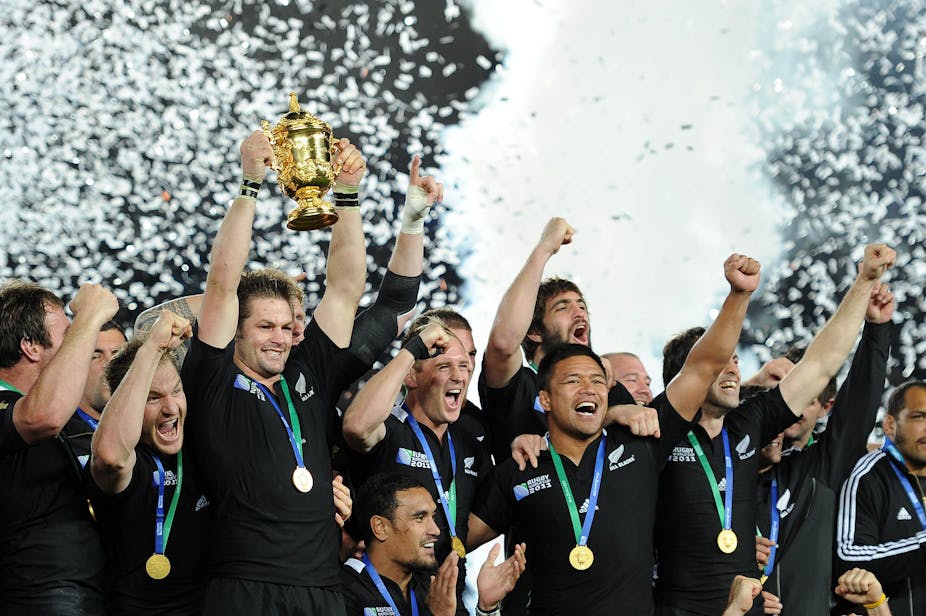New Zealand is celebrating the All Blacks’ victory over France in the Rugby World Cup.
Over the course of the tournament The Conversation has brought you stories about all aspects of the game.
And with expert analysis from academics on both sides of the Ditch, we can certainly claim to have the smartest coverage of the tournament.
Here’s a taste of it.
André Brett, PhD candidate in the history of New Zealand at the University of Melbourne on accusations that the traditional haka is “unsportsmanlike”
“Kapa o Pango has more specific thematic relevance to the All Blacks and is reserved for special occasions.
"It expresses the team’s pride in their heritage and their team-mates, the honour to wear the black jersey with its silver fern, and that the occasion on which it is performed ‘defines us as All Blacks’.
"The throat-slitting gesture, far from being an intimation of thuggish violence, represents drawing the breath of life into the heart and lungs and shows that each team member is at the cutting edge of personal performance.”
Brian Stoddart, Emeritus Professor at La Trobe University on the lack on consistency in refereeing in the tournament:
“The sport’s governing body suffers from a rising lack of credibility that threatens rugby’s future.
"At the heart of the International Rugby Board’s problem is the uneasy transition between the old, laughably labelled ‘amateur’ game and the new, so-called ‘professional’ one. To put it simply, the IRB acts in many ways as if the previous regime is still in operation while enjoying the massive financial benefits of the latter.”
And Brian again on allegations of cheating in the game:
“Fierce rivalry has always stalked the rugby world as it does most sports, but arguably in recent years this tribal instinct has developed a much sharper edge.
"It is hard to think of another sport where journalists would so openly label an entire team or prominent players as ‘cheats’, and for that attribution to remain effectively unchallenged by the sport’s ruling body.”
Caroline Finch, Professor in Injury Research at Monash University on the dangers of rugby:
“The sport is a collision and contact sport so we don’t really need our juniors playing like our senior players.
"So why don’t we develop modified rule versions of the game so that children get introduced to the skills of the game gradually. And when they’re physically, cognitively, and developmentally ready to tackle then we’ll allow that.”
Adam Karg, Lecturer in Sport Management at Deakin University on the financial pressures on the host country.
“The Rugby World Cup has returned to New Zealand for the first time since the nation co-hosted the debut tournament 24 years ago.
"But New Zealand Rugby Union head, Steve Tew has already raised concerns about the financing behind the game and whether New Zealand can even afford to play in another World Cup.
"If we judge from a purely commercial standpoint, it might rationally be expected that New Zealand may be hosting the world cup for the last time, despite the success of the sport in the region.”
Chris Davies, Senior Lecturer in Law at James Cook University on the popularity of rugby in Australia:
“Players swapping between the codes highlights the fierce competition that exists within the relatively small Australian sporting market.
"This level of competition doesn’t only relate to players, but also for spectators and sponsorship.
"After all, Australia is the only country in the world with four professional football codes. So rugby union is not only in competition with rugby league, but also Australian rules football and soccer.”
Former Wallabies player, now PhD candidate at the University of Queensland, James Holbeck on how elite players make decisions on the field:
“Research has demonstrated that players recognise specific parts of a pattern in rugby, these elements signal how the pattern is likely to evolve and ultimately assist in generating a solution.
"The more skilled the player, the better he is able to anticipate more quickly and accurately the outcome of a pattern.
"In rugby, critical parts of a pattern that provide key clues might be a player racing up out of the defensive line or differences in the distance between defenders who are typically trying to maintain an equal spacing.”
Sam Richardson, Lecturer in Economics at Massey University, counts the cost of staging the tournament:
“Much of the expenditure to date on facilities and infrastructure has been from all levels of government. It is likely to have been diverted from alternative projects in host cities. These costs, which economists know as opportunity costs, are far from insignificant in this discussion.
"The organisers of the Rugby World Cup have budgeted for NZ$268m (AUD$213m) in ticket sales. If this target is reached, the tournament will run at a projected loss of approximately NZ$40m. Two-thirds of this tab will be picked up by taxpayers, and the remaining third will be picked up by the New Zealand Rugby Union.”
Malcolm Mulholland, Senior Researcher in Maori Studies at Massey University on New Zealand’s all-Maori rugby team:
“Suggestions of ‘apartheid’, ‘preferential treatment’ and ‘separatism’ remain the most prominent arguments for disbanding NZ Maori and they resurface often.
"The team is subjected to New Zealand’s racist underbelly who cannot appreciate that the team is an example of positive affirmation rather than some skewered attempt to be racially superior.
"Apart from being positive examples for Maori, who suffer from some of the most horrendous socio-economic statistics, they also provide another pathway forward for promising Maori players.”

